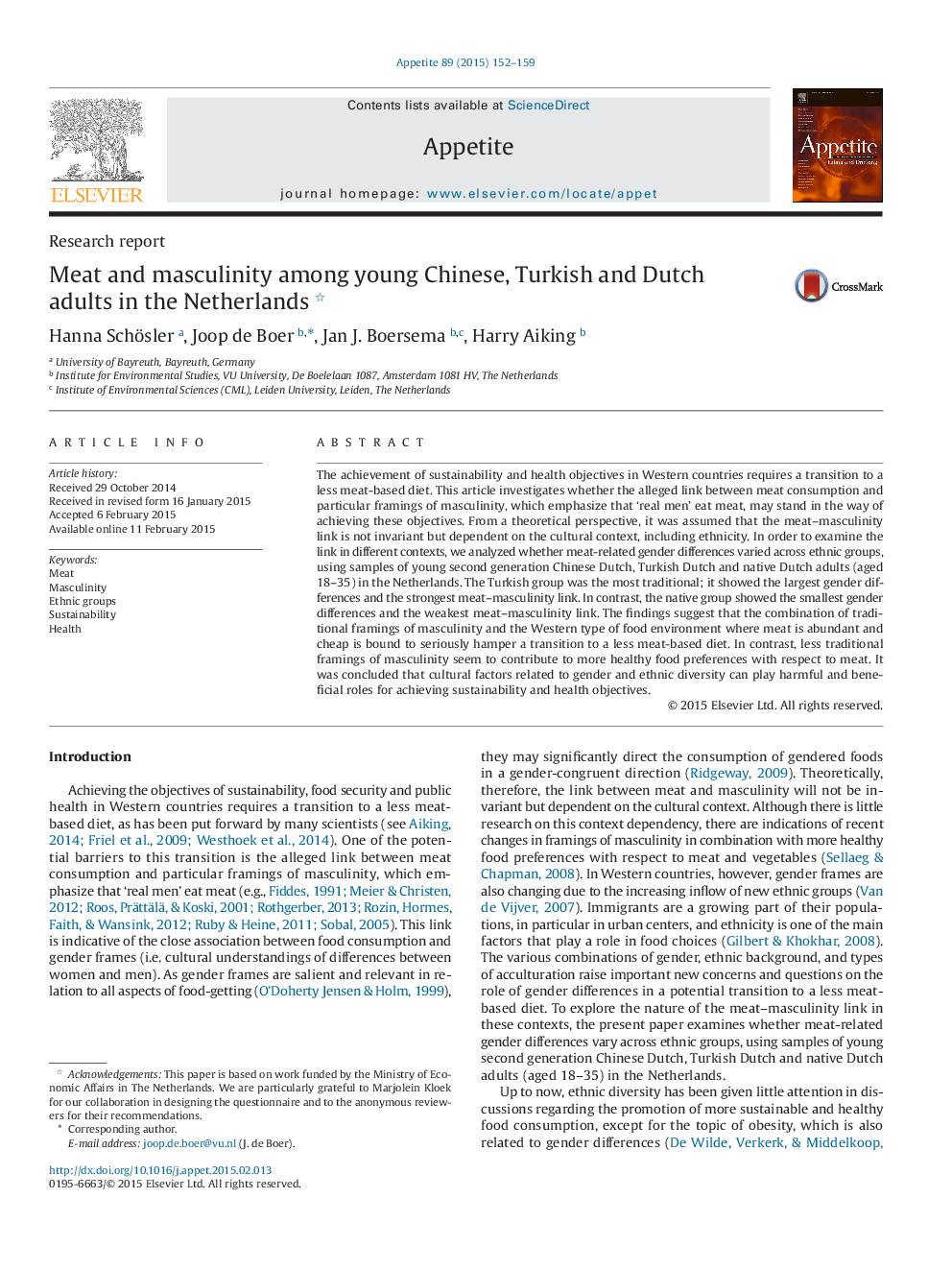| کد مقاله | کد نشریه | سال انتشار | مقاله انگلیسی | نسخه تمام متن |
|---|---|---|---|---|
| 7308844 | 1475391 | 2015 | 8 صفحه PDF | دانلود رایگان |
عنوان انگلیسی مقاله ISI
Meat and masculinity among young Chinese, Turkish and Dutch adults in the Netherlands
ترجمه فارسی عنوان
گوشت و مردانگی در بین جوانان چینی، ترکی و هلندی در هلند
دانلود مقاله + سفارش ترجمه
دانلود مقاله ISI انگلیسی
رایگان برای ایرانیان
کلمات کلیدی
گوشت مردانگی، گروههای قومی، پایداری، سلامتی،
ترجمه چکیده
دستیابی به اهداف پایداری و سلامت در کشورهای غربی نیازمند انتقال به یک رژیم غذایی کمتر مبتنی بر گوشت است. این مقاله به بررسی اینکه آیا ارتباط بین مصرف گوشت و قیمتی خاص، که تأکید بر اینکه "مردان واقعی" گوشت می خورند، ممکن است در راه دستیابی به این اهداف قرار گیرند. از دیدگاه نظری، فرض بر این بود که پیوند گوشتی مردانه غیرمستقیم نیست، بلکه وابسته به زمینه فرهنگی، از جمله قومیت است. برای بررسی لینک در زمینه های مختلف، ما تجزیه و تحلیل کردیم که آیا تفاوت های جنس مربوط به گوشت در گروه های قومی متفاوت است، با استفاده از نمونه های نسل دوم نسل چینی هلندی، ترکی هلندی و بزرگسالان هلندی مادری هلندی (18-35 ساله) در هلند. گروه ترکیه سنتی ترین بود؛ آن را نشان می دهد بزرگترین تفاوت های جنسیتی و قوی ترین لینک مردانه مردانه. در مقابل، گروه بومی کوچکترین تفاوت های جنسیتی و ضعیف ترین پیوند گوشت مردانه را نشان داد. یافته های این پژوهش نشان می دهد که ترکیبی از ساختارهای سنتی مردانگی و نوع غربی نوع غذا که گوشت فراوان و ارزان است، به طور جدی مانع انتقال به رژیم غذایی کم گوشت می شود. در مقابل، ساختارهای سنتی کمتر از مردانگی به ترجیحات غذای سالمتر نسبت به گوشت کمک می کنند. به این نتیجه رسیدند که عوامل فرهنگی مربوط به جنسیت و تنوع قومی می توانند نقش مضر و سودمند برای دستیابی به اهداف پایداری و سلامت را بازی کنند.
موضوعات مرتبط
علوم زیستی و بیوفناوری
علوم کشاورزی و بیولوژیک
دانش تغذیه
چکیده انگلیسی
The achievement of sustainability and health objectives in Western countries requires a transition to a less meat-based diet. This article investigates whether the alleged link between meat consumption and particular framings of masculinity, which emphasize that 'real men' eat meat, may stand in the way of achieving these objectives. From a theoretical perspective, it was assumed that the meat-masculinity link is not invariant but dependent on the cultural context, including ethnicity. In order to examine the link in different contexts, we analyzed whether meat-related gender differences varied across ethnic groups, using samples of young second generation Chinese Dutch, Turkish Dutch and native Dutch adults (aged 18-35) in the Netherlands. The Turkish group was the most traditional; it showed the largest gender differences and the strongest meat-masculinity link. In contrast, the native group showed the smallest gender differences and the weakest meat-masculinity link. The findings suggest that the combination of traditional framings of masculinity and the Western type of food environment where meat is abundant and cheap is bound to seriously hamper a transition to a less meat-based diet. In contrast, less traditional framings of masculinity seem to contribute to more healthy food preferences with respect to meat. It was concluded that cultural factors related to gender and ethnic diversity can play harmful and beneficial roles for achieving sustainability and health objectives.
ناشر
Database: Elsevier - ScienceDirect (ساینس دایرکت)
Journal: Appetite - Volume 89, 1 June 2015, Pages 152-159
Journal: Appetite - Volume 89, 1 June 2015, Pages 152-159
نویسندگان
Hanna Schösler, Joop de Boer, Jan J. Boersema, Harry Aiking,
